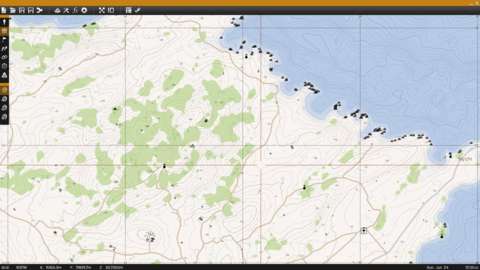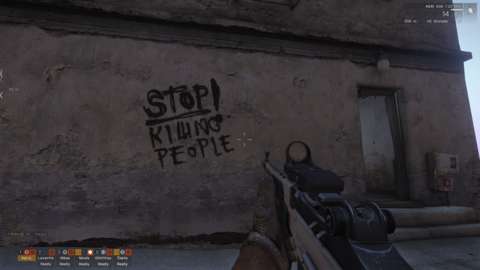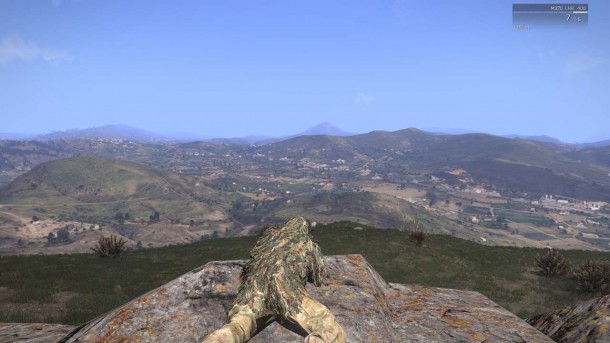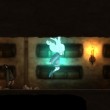Arma 3 Updated Review
The most famous of the classic blunders, we're told, is getting involved in a land war in Asia. Arma III should be at a healthy remove then, centered as it is around the battle for a fictional Mediterranean archipelago. It certainly plays all the right cards: vaguely foreboding news montages, not-so-vague allusions to real-world conflicts, and realistic weaponry and other military miscellanea. Here is the modern shooter, dressed for success.
But what's to be said for the wisdom of appending a campaign mode to a game that has traditionally been appreciated as a multiplayer creative suite? There's a blunder for the modern era. The Arma series is known foremost as a platform: a malleable assembly of characters and military objects, and rules to govern their behavior. Modding enthusiasts leverage in-game editors and a relatively ungated code structure to produce their own playable content in lieu of formal designs, and to great effect. It was odd, then, to see some lamenting the relegation of Arma III's campaign to three downloadable post-release entries. There's a stubborn canard that asserts a video game's single-player campaign, if offered, must be its nominal flagship, even when in practice it's a secondary (or tertiary) concern for player and developer alike.
But a campaign was promised, and so a campaign must be delivered. NATO forces are in the midst of a drawdown on the island of Stratis, when the once-friendly local forces lash out in a surprise attack. A multistage affair ensues, playing out in a dull triptych: Survive. Adapt. Win. The grunt tasked with doing that surviving, adapting, and winning is one Corporal Kerry, who reacts to every order he's given with a beleaguered protest ("You want me to do what??"), which is a curious trait for a soldier with a non-zero amount of experience. You, as Kerry, take on an escalating part in an escalating war, eventually graduating from a follower role on Stratis' meager 20 square kilometers to commanding a squad on Altis and its staggering 270 square kilometers. There are a few vague allusions to an overarching plot involving a British black-ops group and some suspicious earthquakes, but neither plot point stakes much of a claim on the proceedings.
The campaign is a strange beast, torn between an earnest attempt to render the tedium and dispassionate remove that color modern warfare, and the Hollywood bombast that colors Modern Warfare a la Call of Duty. This is the sort of conflict where acronyms (NATO, FIA) fight acronyms (CSAT, AAF) over acronyms (LZs, OPs). But it's also the sort where trite wartime quotes fill the interstitial screens, and where the only attempt to characterize the enemy force is an epithet--"greenback"--that's occasionally spat. Arma III is content to let you idle while an ally goes through a lengthy, inaudible, and ultimately inconsequential discussion with a checkpoint guard, or direct you to report in to characters whose only purpose is to refer you over to talk to your commanding officer a few yards away. It restricts your character's movement speed to a controlled jog--elbows in, gun stock squarely nestled on the shoulder--and sends you humping across the hills and valleys of Altis for miles without encountering anything worth loosing a round at. Then an electric guitar wails, a bomber starts strafing your position, and you're forced to bug out at the same ponderous pace that you entered with seconds ago.

The fractured nature of Arma III's campaign makes for an uneven experience at best, but that variability does have an accentuating effect when things fall into a more natural stride. For one, there's a real fragility to Kerry and his unit. So when Bohemia dangles the carrot of an escape helicopter before you at the end of one grueling mission, and then snatches it away with an untimely bit of antiaircraft fire, Kerry's horror-struck pleas of "no no No No NO!" take on a bitter pathos. The introduction of the island of Altis is another high point, presenting a rigorous mission that sees Kerry attempting to rearm and regroup after being stranded behind enemy lines. When Arma III isn't trying to show off a fancy new military gadget or weave in its half-baked tale of black-ops intrigue, when it's leaning on the more tangible drama of a botched rescue or frantic coms chatter, it simmers in a way most shooters can't.
It helps that your forces aren't punctuating every explosion with a string of expletives, of course. But for the better part of the campaign I supplied my own. Not two skirmishes into the Survive campaign's relatively tame first level, it seems I'd already died more times than I had in the entirety of Dark Souls, and that game's motto is "Prepare to Die." I'd hop off five-foot-tall ledges and crumple into a bloody heap. I'd get gunned down while looking at the full screen map, after being prompted to look at the map. I'd open up the help menu for instructions on some trial-by-fire task, and get killed while reading them. I'd succumb to razor-accurate shots fired by enemies in distant hills, enemies who never seemed to have a scope on their guns when I eventually overcame them. Some of these instances were learning experiences, and not soon repeated. Others felt like side effects of the campaign's delay and piecemeal release schedule--what Arma veteran would have welcomed a long-awaited mode that leads with a thorough introduction to controls he or she is already familiar with?
The campaign is a strange beast, torn between an earnest attempt to render the tedium and dispassionate remove that color modern warfare, and the Hollywood bombast that colors Modern Warfare a la Call of Duty.
Arma III uses the full keyboard for its array of possible actions, split between personal affairs like toggling flashlights and binoculars, and issuing orders to your squad. Much of the heavy lifting is foisted on the mousewheel, of all things, which scrolls through contextual actions for almost anything that's to be done in the game. The controls alternate between instrumental and overly finicky, but they never cease to be an aspect of Arma III that requires constant attention. The unwieldiness does lend combat a certain gravitas, however. Most modern shooters grant an athletic flourish to the act of killing; here, the satisfaction of downing an enemy comes from the knowledge that he won't be shooting at you anymore, not in how adroitly you head-shotted him.
There isn't such a positive spin to be put on Arma III's artificial intelligence, however. It's particularly damning, because the strategic underpinnings require a close coordination with squadmates that the game's engine isn't prepared to give. Teammates follow commands at their leisure, if they follow them at all. During one marathon trek across the island, I reached my destination with only two of my eight-man squad in tow. Looking back from the top of our hilltop destination, I could chart the lost squad members like dropped breadcrumbs--one trapped on a rock, four frozen solid in the middle of a field, and the last determined never to leave the two-story building he'd wandered into of his own volition. All attempts to order a regroup returned a chorus of firm but vexing "Negative." So much for "no man gets left behind," then.

Though Arma III's campaign may be a bit of a dud, the rest of the game remains more than capable of carrying a payload. There are the packaged showcases, which are one-off missions that introduce the game's more varied weapons, vehicles, and techniques in isolation. There's a firing range that offers a bit of shooting gallery-style diversion. What's of more significance is the multiplayer, which bolsters the mission-running experience by supplanting the artificial intelligence with human allies that need less babysitting. They aren't always any more helpful than the AI (and they're a tad more likely to frag you), but they're better company, and one good session is worth trawling the server browser for a little while. A capable human team can achieve the closest thing to agility that Arma III's punctilious controls allow, leapfrogging between bits of cover and sweeping buildings with a collective conscience.
Better still is the library of mods, packed with thousands of player-created variants that run the gamut from atomic tests and rally races to fully-scripted missions and dynamic war simulations. You can take on a gauntlet of snipers, playing off the variable lines of sight that Altis' hills and valleys proffer. You can attempt a recreation of the real-life Neptune Spear mission that takes some curious artistic liberties. Chief among the offerings is Wasteland, a survivalist affair that highlights Arma III's talent for brooding, deliberate engagements, where discretion begins to really feel like the better part of valor. Or you could simply wander the islands, grabbing a few pictures to put alongside the towns, salt flats, and castles that litter the map's expansive topography.
In any direction you go, there's loosely structured fun to be had. It's there where the islands Bohemia Interactive have created are put through their paces, stretched and warped by the collective whim of the internet, unconstrained by the expectations that burden the words "modern warfare."









